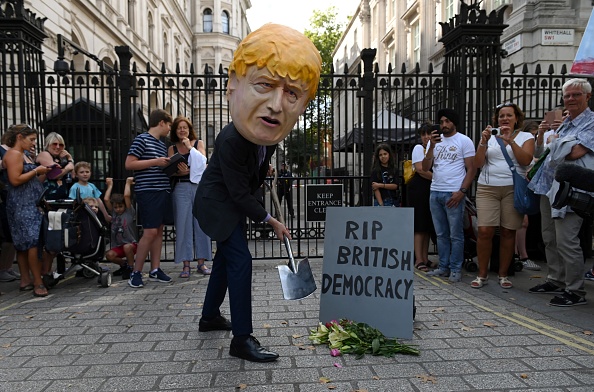This epic proroguing gamble shows that Boris is not about to let dithering be his downfall

Countless criticisms were levelled at Theresa May during her final months in power.
She was accused of being stubborn, blinkered, deaf to the mood of the public, and innumerate when it came to considering the parliamentary maths.
These are legitimate rebukes, but they were not her biggest failing. The fatal flaw in the tragedy that was the May regime was the Prime Minister’s propensity for paralysis, her inability to adapt to a crisis, her tendency instead to freeze like a deer in the headlights when things didn’t go her way.
Say what you like about Boris Johnson (arrogant, reckless, self-obsessed), but this is one weakness he does not share with his predecessor.
On Tuesday, it looked as though the winds could be starting to blow in favour of the anti-Boris faction who are adamantly against no-deal. After weeks of squabbling amongst themselves, the rebel MPs had come up with a plan: pass legislation in parliament to force the Prime Minister to request an Article 50 extension and delay the looming Brexit deadline once again.
But nothing about Boris or his crew suggests that this is a team that plays by the rules. And while May spent months unsuccessfully trying to browbeat or bribe recalcitrant MPs who were threatening to torpedo her plans, Boris has circumvented them.
He has, in fact, taken a leaf from the book of one of his classical heroes Alexander the Great: rather than painstakingly attempt to untangle the parliamentary Gordian Knot, he has sliced right through it, and dared anyone to question whether this amounts to breaking the rules.
Because the fact is that we just don’t know where his plan – asking the Queen to prorogue parliament in order to deny MPs the chance to be difficult – falls on the spectrum of legality.
Labour’s shadow attorney general Shami Chakrabarti has argued that the move would amount to the “gravest abuse of power and attack on UK constitutional principle in living memory” and warned that it could be blocked by a judge. House of Commons speaker John Bercow, who knows his parliamentary precedents, has called it “a constitutional outrage” and committed to blocking any attempt to do so earlier this month.
This isn’t the first time a Prime Minister has prorogued parliament. The Labour government under Clement Attlee used the procedure in 1948 to prevent the House of Lords from blocking its nationalisation agenda.
But the timing of this, designed to run out the clock so MPs cannot influence the greatest constitutional issue of a generation, when the government lacks a majority and is led by someone who has not won a General Election, is unprecedented.
Yet this barely matters. While a host of voices may be threatening legal action, the truth is that it would work overwhelmingly in Boris’ favour if his gambit ended up in the courts.
The image yet again of a select group of unknown judges determining whether the democratically appointed Prime Minister is allowed to enact the will of the people (as he sees it) would power him through the election he knows he will shortly have to fight. Boris would be the people’s champion fighting against the establishment – and we know how effective that message can be.
There’s a similar issue with the desperate calls for the Queen to intervene, which would just replace one constitutional crisis with another and call into question the role of the monarchy in a parliamentary democracy. That’s probably why Her Majesty speedily acquiesced to the Prime Minister’s request.
That’s not to say the road ahead is smooth. Boris has damaged the credibility of his fledgling administration in parliament and within his own party, with a host of Conservative MPs speaking out to condemn the move.
That doesn’t matter so much now, but it will when he tries to pick up the pieces after all this is over and rebuild his fractured party – let alone the country, or his reputation.
It’s an epic gamble that may yet backfire. But what did we expect against the backdrop of nationwide fatigue with May’s robotic refrain that “nothing has changed”?
The Boris administration may yet prove similarly tragic, but he is making damn sure that dithering will not be his downfall.
Main image credit: Getty